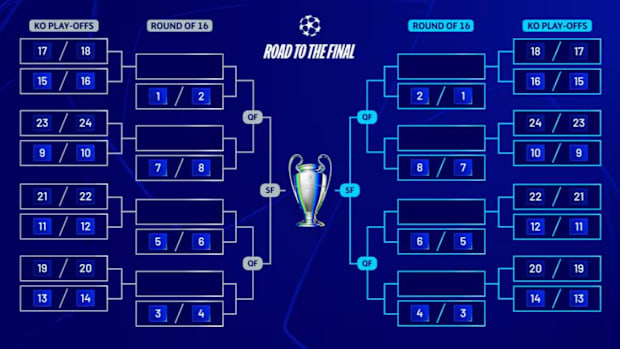champions league explained for beginner
champions league explained for beginner
Blog Article

The UEFA Champions League is one of the most prestigious and popular football (soccer) tournaments in the world. It features top-tier clubs from across Europe competing for the ultimate continental title. Whether you're new to football or just unfamiliar with how the competition works, here’s an easy-to-understand guide to the UEFA Champions League.
What is the UEFA Champions League?
The UEFA Champions League (UCL) is an annual football competition organized by the Union of European Football Associations (UEFA). It is open to the best club teams from the various European football leagues. The competition pits the strongest teams in Europe against each other in a knockout format, ultimately deciding the best club team on the continent. slot gacor deposit 5000
The History of the UEFA Champions League
The competition was originally known as the European Cup, first held in 1955. It was renamed the UEFA Champions League in 1992 to reflect its growing popularity and the expansion of teams participating. Since then, it has become the most prestigious tournament in club football.
How Does the UEFA Champions League Work?
The competition follows a very structured format, beginning with group stages and concluding with the final match. Here’s a breakdown of the key stages:
1. Qualification Phase
Not every club in Europe can enter the Champions League directly. Teams must first qualify through their national leagues or via specific qualification rounds. For example, the top teams in leagues like the English Premier League, La Liga (Spain), Serie A (Italy), and others automatically qualify for the group stages. However, other teams that didn’t finish at the top can still qualify by playing in a series of qualification rounds.
2. Group Stage
Once the teams are set, the competition enters the group stage, which is the first round of the tournament. There are 32 teams split into eight groups of four teams each. These teams play a round-robin format, meaning they play each other twice – home and away – for a total of six matches. Each group’s teams compete for points (win = 3 points, draw = 1 point, loss = 0 points).
The top two teams from each group, based on points, advance to the next round. The third-place teams may still have a chance to continue in another tournament called the UEFA Europa League.
3. Knockout Rounds
After the group stages, the competition moves into the knockout rounds, which are a series of two-legged matches. This means that each pair of teams plays two games: one at home and one away. The team that scores the most goals over the two matches advances to the next round. If the scores are tied, the tie is decided by away goals or, if necessary, a penalty shootout.
The knockout rounds consist of the following stages:
Round of 16: The top two teams from each group face the second-place teams from other groups.
Quarterfinals: The eight remaining teams play for a place in the semifinals.
Semifinals: Four teams are left to fight for a place in the final.
Final: The last two teams face each other in a single match to decide the winner.
4. The Final
The Champions League final is one of the biggest football events in the world. It is held at a neutral stadium, which changes each year. The winner of the final is crowned the best club team in Europe and receives the coveted UEFA Champions League trophy.
Teams in the UEFA Champions League
The teams that compete in the Champions League are the best in Europe, and the competition often includes world-renowned clubs like:
Real Madrid (Spain)
FC Barcelona (Spain)
Bayern Munich (Germany)
Manchester City (England)
Liverpool (England)
Paris Saint-Germain (France)
Juventus (Italy)
Chelsea (England)
These teams have a rich history and often dominate the competition. However, smaller clubs can also make a significant impact, adding excitement and unpredictability to the tournament.
Why is the UEFA Champions League Important?
The Champions League is not just about winning a trophy; it’s also about prestige, financial rewards, and international recognition. For clubs, winning the Champions League is a massive achievement that puts them at the top of the European football pyramid. Additionally, participating in the competition provides clubs with significant revenue from broadcasting rights, sponsorships, and ticket sales.
Key Terms to Know
Group Stage: The first phase of the tournament where 32 teams are divided into eight groups of four.
Knockout Stage: A series of elimination rounds where teams face each other in two-legged matches.
Draw: The process of randomly pairing teams for the group stage and knockout rounds.
UEFA Coefficients: A ranking system used to determine which teams get to play in the Champions League, based on their past performances in European competitions.
Golden Boot: The award given to the top scorer of the tournament.
The UEFA Champions League Trophy: The prestigious cup awarded to the winners of the competition.
Notable Moments in Champions League History
Over the years, the UEFA Champions League has provided some unforgettable moments:
Liverpool’s comeback against AC Milan (2005): In the final, Liverpool came back from 3-0 down at halftime to win on penalties, a match often referred to as the "Miracle of Istanbul."
Cristiano Ronaldo’s dominance: Ronaldo has been a key figure in many Champions League seasons, especially with his time at Real Madrid, where he helped the team win four titles.
Real Madrid’s record wins: With 14 titles (as of 2025), Real Madrid is the most successful club in the history of the competition.
Conclusion
The UEFA Champions League is much more than just a football competition—it’s a celebration of the sport at its highest level. With elite clubs, intense rivalries, and unforgettable moments, it draws millions of fans around the world. Whether you’re a beginner or a seasoned fan, understanding the structure and significance of this tournament enhances the enjoyment of watching the best football teams in Europe battle for glory.